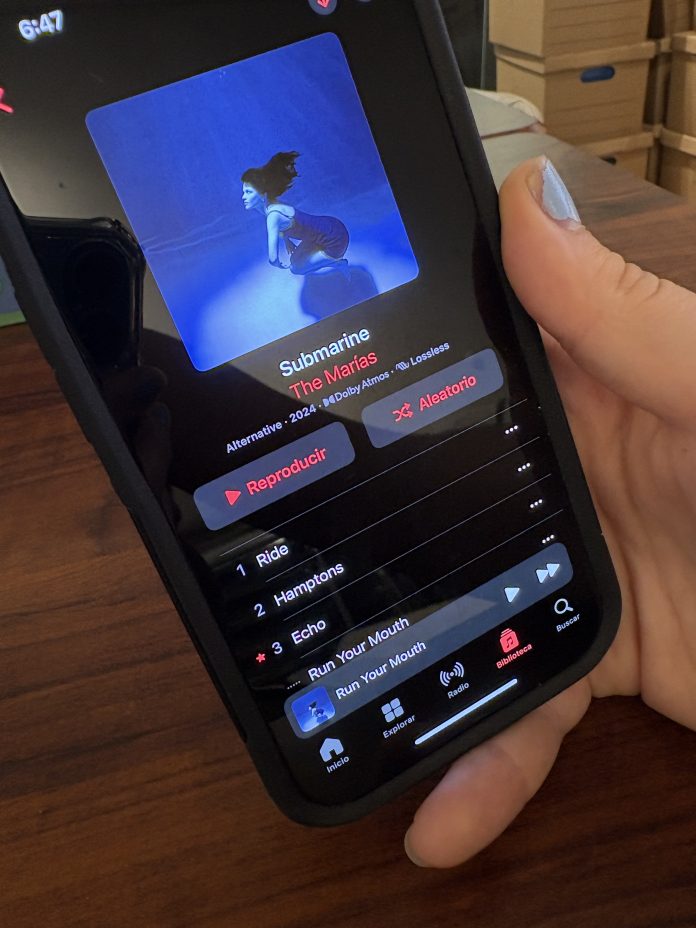Anna Jones
Contributing Writer
Hitting “play” on indie-pop band The Marías’ sophomore album, “Submarine,” transports you into a dream-like, hypnotic dimension. Nearly three years after their debut album “Cinema,” lead singer and songwriter María Zardoya envisioned a contrast to the “love, intimacy, and passion” of the deep red in “Cinema,” opting this time around for a dark blue, symbolizing “grief and loneliness,” but also “hope, rebirth, and exploration” she told Instagram followers almost two months before the release. Along with their signature fusion of English and Spanish lyrics — inspired by Zardoya’s Puerto-Rican roots — the band blends genres from jazz to Latin styles like Reggaetón. While still emulating their past work, “Submarine” feels more sleek and mature, evolving their own unique sound rather than experimenting with others’.
The album cover shows Zardoya floating underwater, her introspective gaze directed towards the surface, illuminated by soft light. The art captures the album’s mood, heavily revolving around self-reflection, self-discovery, and growth after heartbreak. The visual of being submerged underwater illustrates a metaphor for feeling trapped or drowning in sorrow. Zardoya’s poignant lyrics, paired with the lush instrumentals from drummer Josh Conway, guitarist Jesse Pearlman, and keyboardist Edward James, create a deeply vulnerable work of art, exploring topics of isolation, longing, and desperation in an unrequited relationship. While each track captures different sentiments, four songs best reflect the emotional depth of the album.
“Submarine” begins with “Ride,” an edgy, synth-heavy interlude. A robotic voice hypnotizes us with repetitive lyrics: “We can make a movie / We can take our time / Introducing submarine / Careful while you’re cruising / Gonna be a ride.” The muffled and echoed sounds heard at the beginning immerse the listener as if they were truly submerged underwater, setting a cinematic tone for the rest of the album.
“Echo” establishes the central narrative — sensing a shift in a relationship, longing for the memories again, and feeling alone after it ends. Zardoya sings of spiraling into madness and desperation while awaiting a response that never comes: “I landed, then I felt myself decay / Was crying out for help, but no one came.” The weight of emotion consumes the speaker, who feels alone and misunderstood by those around them. The refrain, “Your cry is an echo and I will let go of your love / Your voice is an echo and I will let go of your love” feels like a self-affirmation, reinforcing the speaker’s resolve to detach and heal, despite the echoes of their ex-lover’s voice lingering in their head.
In “Blur,” Zardoya admits, “I guess I’d bet if I see you again / I’d get excited / Don’t care don’t care / I lied I do.” We witness a paradox of emotions, showing how the speaker is struggling to let go. However, they acknowledge some progress: “I might make it wonderful for once / In my life but nothing’s quite like it was / Surprised something inside me is a blur.” “Blur” in this context could also connote a realization that their vision was “blurred,” symbolizing their inability to recognize warning signs in the relationship that could have led them to achieve an ending with closure.
“Sienna,” the album’s final track, may be the most heartbreaking song Zardoya has written to date. Feelings of nostalgia and longing for a lost future saturate the lyrics. The speaker felt deeply devoted to, safe with, and understood by this lover, even imagining raising a child with them: “See her face in the forest then it disappears.” This child, named “Sienna,” embodies a haunting symbol of the future they mourn. The song ends abruptly, leaving us in a deafening silence, as if mirroring the speaker’s unresolved grief.
Harper’s Bazaar described “Submarine” as “a love letter to our bluest days,” and I couldn’t agree more. The album plunges into the depths of the soul, breaking you open but also mending you back together. It validates your feelings, honors your struggles and growth, and stays with you long after the music fades. I genuinely haven’t been able to stop listening since its release, and frankly, I don’t think I ever will.











